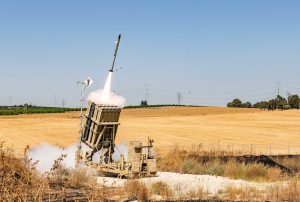Long seen as a renegade province by China, Taiwan has lived in fear of the day war breaks out. Given that it is getting clearer by the day that the United States will come to Taiwan’s aid should China attack, it remains to be seen whether China has the ability to bring Taiwan back into the fold via military means. What is clear though, is that China’s vast arsenal of missiles will wreak havoc on Taiwan, even if China is unable to permanently put boots on the ground in Taiwan.
To prevent such a scenario from happening, Taiwan has looked toward Israel, which also lives in fear of its neighboring enemies raining down hell and destruction. In response, Israel developed the Iron Dome, an air defense system boasting a 90 percent success rate at intercepting incoming rockets. Pundits argue that if Taiwan was to take a leaf out of Israel’s book, and acquire the Iron Dome, it could cut China’s advantage in missiles back down to size.
However, Taiwan’s dream was shattered after Iran’s two successive missile strikes on Israel this year. The Iranian missiles lighting up Israel’s night sky proved that the Iron Dome would have no chance standing up to China’s missile barrage.
In April, in response to Israel’s bombing of Iran’s embassy in Damascus, Iran mounted its first attack, launching more than 300 drones and missiles at Israel. If we take Israel and its allies at their word, 99 percent of the Iranian projectiles were intercepted, causing minimal damage.
The outcome was to be expected, but the attack was not representative of Iran’s full ability. Iran’s April attack on Israel was more symbolic than substantive, intended to appease hawks in Iran and the Axis of Resistance, rather than to kill and destroy.
At Iran’s National Army Day Celebration in Beijing this year, I was told by an Iranian diplomat that Iran had purposefully held back on the attack, telegraphing its strike days before and using outdated missiles. “If Iran had committed to the attack, then things would have been very different,” he said.
Indeed, when Iran mounted its second attack in October, retaliating against Israel’s assassination of Hamas’ leader Ismail Haniyeh and Hezbollah’s leader Hassan Nasrallah, Israel was given a run for its money. In the October strike, Iran used much harder to intercept ballistic missiles, which includes the much-touted hypersonic missiles.
This time, instead of giving a specific number, Israel gave a vague statement, claiming that it and its allies intercepted the “majority” of projectiles. Satellite images analyzed in U.S. media showed that although Israel’s intelligence prevented it from suffering significant losses, many Iranian missiles were able to bypass the air defense system. The Iron Dome’s reputation took a serious beating.
Taking into consideration these facts, it would be a fool’s errand for Taiwan to acquire the Iron Dome, which is likely to be even less effective for Taiwan than it is for Israel.
First, Israel had help from not just the U.S., but also the U.K., Jordan, and France intercepting the missiles. While many countries would voice their protest should China attack Taiwan, few would help Taiwan, even indirectly. Aside from the U.S., even fewer countries would directly come to Taiwan’s aid should China attack. Taiwan would have to try knocking Chinese missiles out of the sky practically by itself.
Second, due to the sheer distance between Iran and Israel, Iranian missiles have to traverse 1,700 kilometers before reaching Israel, meaning that Israel had 12 minutes to brace for impact. By contrast, Taiwan lies only 160 kilometers away from China, meaning that Taiwan will have far less time to respond to missile launches from the mainland.
Third, China boasts a far more formidable array of missiles compared to Iran. Recognizing that it has a long way to go before it can catch up to the U.S. Navy, China devoted much of its effort honing its anti-access/area denial ability. Currently, China has one of the largest and most sophisticated missile arsenals in the world, with 2,300 to 2,400 ballistic missiles. Although Iran has a larger arsenal, at 3,000 ballistic missiles, most of its arsenal consists of reverse-engineered older-generation Chinese missiles, which pale in comparison to China’s more recent models.
Recently, China flexed its military muscle by carrying out a test-launch of an intercontinental ballistic missile – for the first time since 1980. The ICBM, speculated to be either a DF-31 or a DF-41, could travel between 7,200 and 15,000 km. The move was widely interpreted as warning the United States what it could face should it cross China’s redline.
China has no need for long-range ballistic missiles when attacking Taiwan, however. Its 1,200 short-range missiles, such as the DF-11, DF-12 and DF-15, would be more than sufficient. This is not taking China’s vast stockpile of drones and rockets into consideration, the latter of which reportedly could hit targets 160 km away – just enough to cross the Taiwan strait.
Fourth, playing defense is incredibly expensive. When Iran struck Israel in April, Israel spent $550 million intercepting Iranian drones and missiles, which amounts to 1.8 percent of Israel’s annual military expenditure. The missiles Israel used to intercept Iranian missiles, namely the Arrow-2 and Arrow-3, cost $2 to $3 million apiece. In comparison, the most expensive Iranian ballistic missiles only cost $1 million apiece.
In this respect, given that Taiwan’s economy is dwarfed by the behemoth that is China, under no circumstance would it be sustainable for Taiwan to try intercepting Chinese missiles. Wave after wave of saturated attacks mounted by China would inevitably overwhelm Taiwan’s defenses, regardless of whether Taiwan has an Iron Dome in place or not. Taiwan would be better off spending its money elsewhere.
































